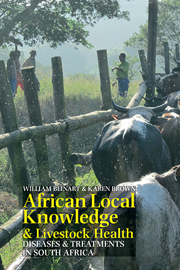Book contents
- Frontmatter
- Contents
- Acknowledgements
- Abbreviations
- Names of Common Diseases
- List of Maps, Photographs & Tables
- 1 Introduction: African Local Knowledge & Veterinary Pluralism
- 2 Ticks, Tick-borne Diseases & the Limits of Local Knowledge Introduction
- 3 ‘The Grave of the Cow is in the Stomach’: Environment & Nutrition in the Explanation & Prevention of Livestock Diseases
- 4 Transhumance, Animal Diseases & Environment
- 5 Plants & Drugs: Medicating Livestock
- 6 Medicinal Plants: Their Selection & their Properties
- 7 Animal Health & Ideas of the Supernatural
- 8 Gender, Space & the Supernatural
- 9 Conclusion
- Appendices
- Select Bibliography
- Index
7 - Animal Health & Ideas of the Supernatural
Published online by Cambridge University Press: 05 December 2013
- Frontmatter
- Contents
- Acknowledgements
- Abbreviations
- Names of Common Diseases
- List of Maps, Photographs & Tables
- 1 Introduction: African Local Knowledge & Veterinary Pluralism
- 2 Ticks, Tick-borne Diseases & the Limits of Local Knowledge Introduction
- 3 ‘The Grave of the Cow is in the Stomach’: Environment & Nutrition in the Explanation & Prevention of Livestock Diseases
- 4 Transhumance, Animal Diseases & Environment
- 5 Plants & Drugs: Medicating Livestock
- 6 Medicinal Plants: Their Selection & their Properties
- 7 Animal Health & Ideas of the Supernatural
- 8 Gender, Space & the Supernatural
- 9 Conclusion
- Appendices
- Select Bibliography
- Index
Summary
The cause of disease in animals and humans is the same: bad food, worms and witchcraft.' (Anna Pooe, traditional healer and goat breeder, Shakung, North West Province)
Introduction: Witchcraft and the ambient supernatural
Throughout our field sites there were those who attributed some animal diseases to types of witchcraft, or to supernatural causes, but occult explanations were far rarer than environmental and nutritional aetiologies. As discussed in chapter 3, many of our respondents ascribed familiar diseases like gallsickness to the state of the veld and seasonal changes in the texture of the grasses. We cannot definitively assess how commonplace beliefs in the supernatural and ritual pollution are amongst African rural communities. In part this is because we interviewed across a number of sites, rather than observed practices in one village over a long period. We are thus largely dependent on what people said about their ideas in connection with animal diseases. It is possible that some stockowners regarded witchcraft as a private matter and were reluctant to discuss it. However, many informants spoke openly about supernatural ideas and ritual pollution. Few explicitly refused to talk about these issues and a good range of our interviews at least touched on them.
- Type
- Chapter
- Information
- African Local Knowledge and Livestock HealthDiseases and Treatments in South Africa, pp. 197 - 220Publisher: Boydell & BrewerPrint publication year: 2013



